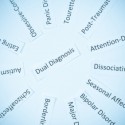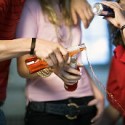Binge drinking affects later cognitive performance
Drinking College students who describe themselves as regular binge drinkers performed considerably worse on a test measuring attention and memory skills compared with students who didn’t binge. The test, by the way, was conducted while all the students were sober.
The results suggest that binge drinking may affect the brain in ways that are normally seen in alcoholics, say the authors of the study, from University of Santiago de Compostela, Galicia, Spain. The study is published online today in the journal Alcoholism: Clinical & Experimental Research.
Binge drinking is defined as men who drink five or more standard alcoholic drinks within a two-hour interval. For women, the amount is four drinks or more. In the study, 42 binge drinkers were compared with 53 students who did not binge or drink alcohol regularly. The students’ brain waves were measured while they performed mental tasks.
“We found that healthy young university students — meaning those with no alcohol use disorder, alcohol dependence or associated psychiatric disorders — who engaged in binge drinking showed anomalies during the execution of a task involving visual working memory, despite correct execution of the task, in comparison with young non binge drinkers. They required greater attentional processing during the task in order to carry it out correctly,” said Alberto Crego, a co-author of the study, in a news release.
The binge drinkers also showed more difficulty distinguishing between relevant and irrelevant information.
“Healthy adolescents and young people who partake in intermittent consumption of large amounts of alcohol — otherwise known as binge drinking — even only once or twice a week, and who do not display chronic alcohol consumption or alcohol dependence may nonetheless suffer alterations at the electrophysiological level in attentional and working memory processing,” Crego said.
source: Los Angeles Times


